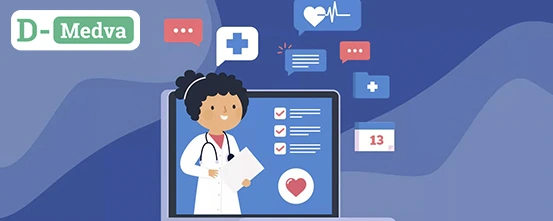Social Media Trends in Healthcare for 2025:
Navigating the Digital Revolution The use of social media for healthcare communication and marketing has increased over the years and so is expected to grow even more by 2025. Digital transformation, technology advancement, as well as the needs and expectations of patients, will ensure that the Role Of Social Media in Healthcare Promotion will not remain static. There will be more changes, which will require new approaches to be developed. In this article, we discuss ‘Social Media in Healthcare’ for 2025, looking at some of the most notable shifts from the growing community of healthcare influencers to personalized communication. Let us analyze the emerging trends in healthcare marketing, advertising, and education. The Rise of Healthcare Influencers in 2025 Healthcare influencers will be among those who will facilitate the transformations anticipated because of the increasing social media usage. By this year, the so-called influencers in healthcare, which will include a plethora of experts, including medical doctors and even social scientist thought leaders, will have even more power to affect how the public views different health issues. Thanks to the trust and credibility at the heart of influencer marketing, those healthcare professionals who maintain a robust social media presence will be in a position to dramatically change patient behavior towards engagement and perpetuate preventive healthcare activities. These influencers, from physicians and nurses to nutritionists and holistic health specialists, will begin working more closely with healthcare institutions to increase awareness and provide public-friendly health content. Content development using live streams, Tik Toks, or Instagram posts by these influencers will help shape social trends in healthcare as it will appeal to the patients as well as the caregivers. Personalized Healthcare Marketing Through Social Media Social media platforms will become accessible for personalized healthcare marketing in 2025. The era of universal marketing is slowly coming to an end. Social media as well as healthcare brands will utilize AI and advanced data analytics for building personalized content which would be tailored to specific patients. Healthcare organizations can create specialized healthcare marketing campaigns, courtesy of AI algorithms that analyze social media interactions with the brand, which tend to be unique to each user. For instance, a hospital could look up specific social media platforms to find out what are health-related topics that are currently trending, and then proceed to generate advertising health services which help to solve the engaging issues. With this kind of hyper personalization, patients and healthcare providers will develop stronger relationships based on trust and engagement. Organizations will utilize these forms of communication to achieve better patient health outcomes as well as promote positive health behavior changes. Video Content: A Dominant Force in Healthcare Social Media Trends video content will keep its significant share on social media. For healthcare organizations, using video for teaching patients, showcasing products, and conducting health campaigns will be crucial to capturing and retaining interest. The likes of YouTube, TikTok, and Instagram will continue to serve as vital platforms for content creation and sharing on a worldwide scale. Healthcare Providers can interact with their audience through live Q & A sessions, ‘day in the life of’ video snippets, or step-by-step guides to medical procedures. These formats allow healthcare professionals to demystify complicated medical issues for patients in an informal friendly manner. In fact, these educational videos will serve as some of the best tools to raise awareness about self-care and motivate patients to consult doctors on time. The Rise of Telemedicine and Virtual Care Over the recent years, the use of Telemedicine and virtual healthcare services has continued to grow at a remarkable rate and this trend is likely to continue in 2025. Social media is expected to play an important role in helping healthcare providers to market their telehealth consultations, remote patient monitoring, and virtual wellness services. Patients will be able to schedule appointments, communicate with healthcare professionals, and obtain their health records through social media applications and tools. The unique feature of social media’s web integration with telemedicine services means patients will have easier access to quality healthcare. Healthcare institutions will leverage social media as a point of sale market where they encourage people to take up telemedicine by demonstrating the effectiveness of virtual consultations. This will be vastly advantageous in remote or impoverished regions where there is little or no healthcare services available. Augmented Reality (AR) and Virtual Reality (VR) for Patient Education As we progress into the later stages of 2025, social media will be an important forum where healthcare institutions will be able to educate the public about their medical conditions with the use of Augmented Reality (AR) and Virtual Reality (VR). These technologies will support more engaging ways for the patients to comprehend their medical conditions, treatment plans, and surgical procedures. As an example, AR tools would permit patients to view anatomical models and interact with organs, tissues, and 3D representations of the patients’ medical issues via their cell phones. On the other hand, VR might provide guided tours of hospitals detailing the various types of surgeries or diagnostic examinations in an interactive and fun way. This type of education is meant to reduce the separation in understanding patients and healthcare workers’ needs and to enhance satisfaction for both sides. Healthcare Social Media Communities for Peer Support For 2025, we envision a growth of online health communities on social media for patients looking for peer assistance or specific information about a disease from other patients. Patients suffering from chronic conditions, particular ailments, or even mental problems will have the opportunity to join various groups on social media networks such as Facebook, Reddit, or other dedicated forums to share their experiences and connect with other patients. These communities will enable users to provide and receive emotional and health assistance, share experiences and comments about their treatment, and create discussions on important issues concerning health care. Most probably, these communities will also include health care professionals and influencers, who will help and direct patients to reliable information while clearing away numerous medical myths that exist










